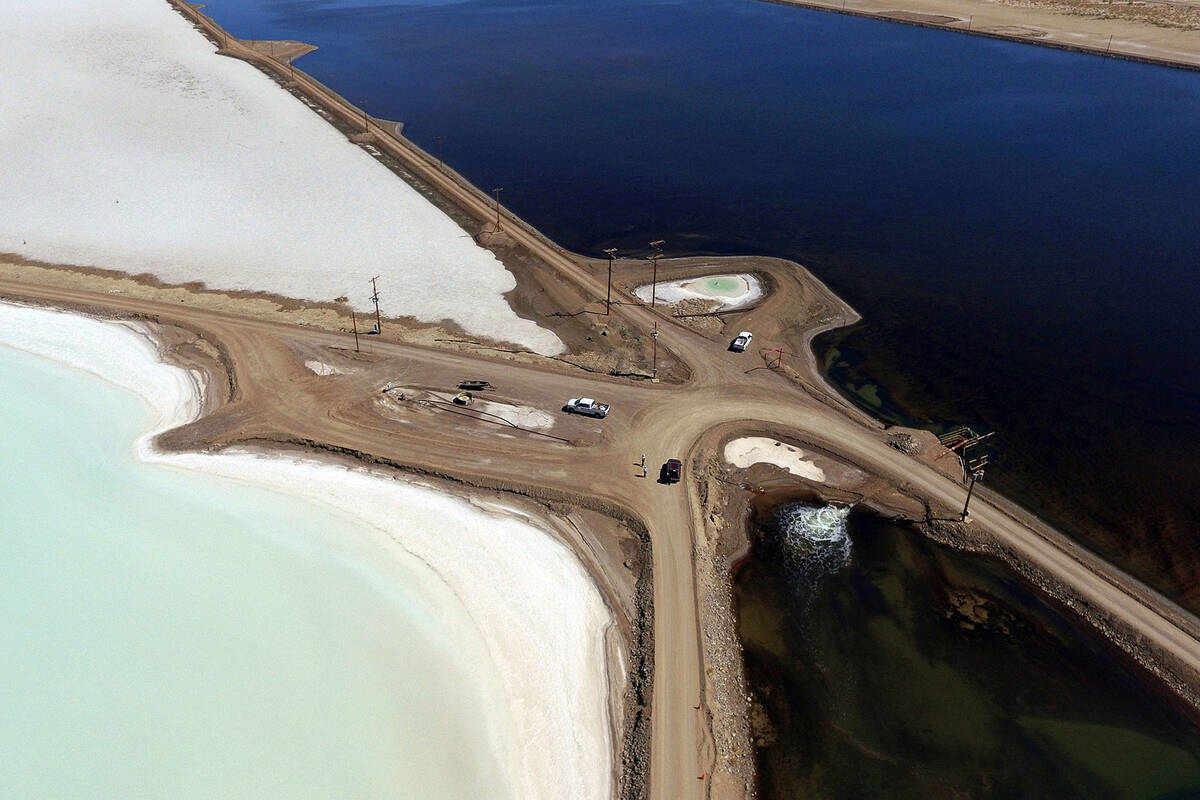Lithium mine was polluting air — until Nevada stepped in
The country’s only fully operational lithium mine had an air pollution problem, Nevada regulators found.
State officials intervened and held a so-called “enforcement conference” on March 25 because the Silver Peak lithium mine in Esmeralda County had been releasing more particulate matter into the air than its permits allowed, according to an enforcement letter obtained by the Las Vegas Review-Journal. The mine is about 40 miles northwest of Tonopah.
Mine operators had failed to keep proper records that report to the state how much is being released into the air, as well.
Any activity that may create emissions — be it mining, manufacturing or otherwise — requires an air quality permit from the state, according to Nevada statutes. That document sets strict guidelines for what can be emitted and at what concentrations.
“Potential major violations were tied to source test failures, specifically, stack emissions exceeding permitted limits, and exceeding operational limits of their permit,” said a spokesperson for the Nevada Department of Environmental Protection, adding that the letter didn’t represent an official violation.
A spokesperson for North Carolina-based mining company Albemarle said it has been in compliance since July of last year, though a spokesperson for the state said the company was again cited in January for not providing requested records.
“The agency’s concerns have been addressed through corrective actions and facility updates that were completed to improve site emissions and compliance activities,” the Albemarle representative said.
What went wrong?
The enforcement document lists the potential violations as an emission of too much particulate matter — the general term for the mixture of solid particles and liquid droplets in the air.
Particles can be inhaled, leading to conditions such as heart attacks and decreased lung function, according to the federal Environmental Protection Agency.
In one instance with Albemarle, regulators found that the mine had exceeded its permit by 484 percent with one of its rotary dryers, massive machines that are used to dry out moisture in the processing phase of lithium.
State regulators don’t test for specific compounds. Rather, they measure for particles that are either 10 or 2.5 microns in size. Both are usually too small to see; a raindrop is about 10 microns in diameter.
Establishing a domestic supply chain of lithium, best known as of late for its use in electric vehicle batteries, has become a hot topic under both the Biden and Trump administrations. Albemarle, in production at the site since the mid-1960s, filed for a 25 percent expansion in acreage in February, pending further environmental review.
Another mine in the county, producing both lithium and boron, begins its construction phase this year.
Scott Lake, Nevada staff attorney at the watchdog nonprofit Center for Biological Diversity, said the reason air quality is regulated is to better protect workers and nearby communities.
It’s concerning that Albemarle wasn’t keeping records properly, Lake said, and the lack of compliance underscores why air quality regulation is a necessary check on companies that may harm the environment.
“Common-sense measures like air pollution limits are needed to keep communities safe and the environment clean,” Lake said. “When companies and regulators stop taking these limits seriously, it puts as all at risk.”
State regulators will make sure Albemarle follows its permits, and Albemarle will fully cooperate, both spokespeople said.
A previous version of this story incorrectly stated the location of Albemarle’s headquarters and contained incorrect information about when the mine stopped releasing more particulate matter into the air than its permits allowed.
Contact Alan Halaly at ahalaly@reviewjournal.com. Follow @AlanHalaly on X.
a0452 - Ap28190050 - Albemarle Us Inc - Silver Peak - 2 - Enforcement by Tony Garcia on Scribd


















